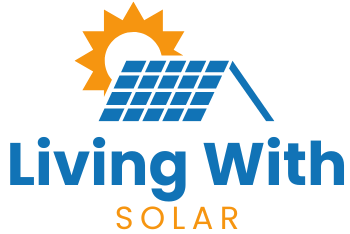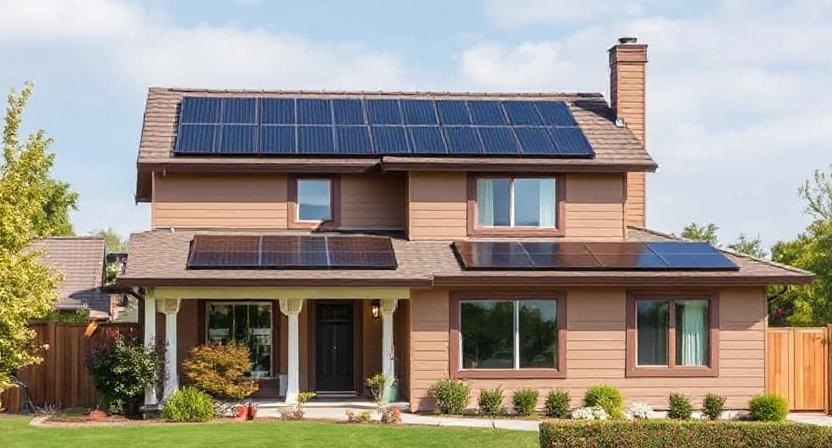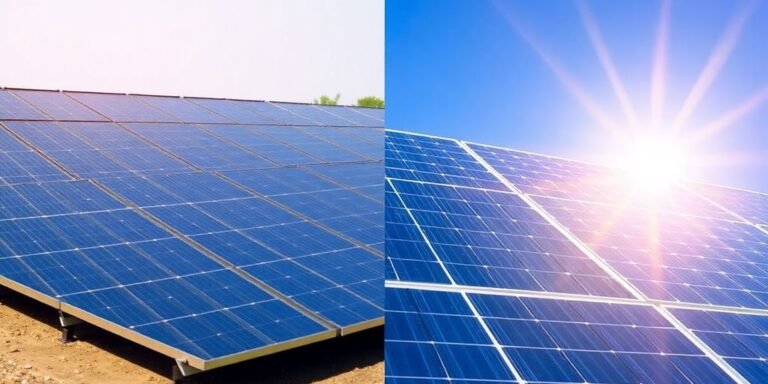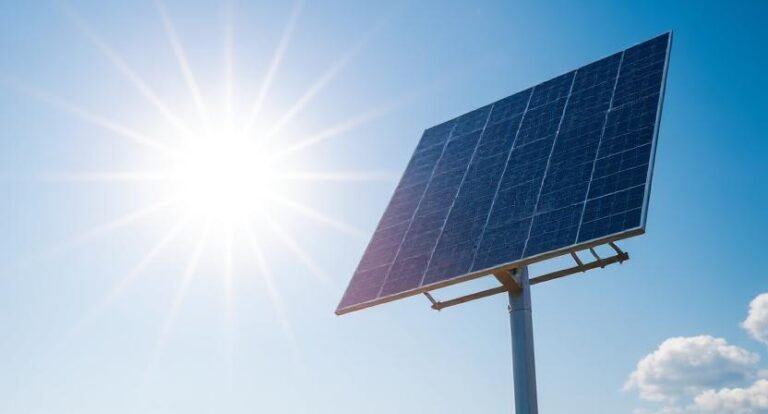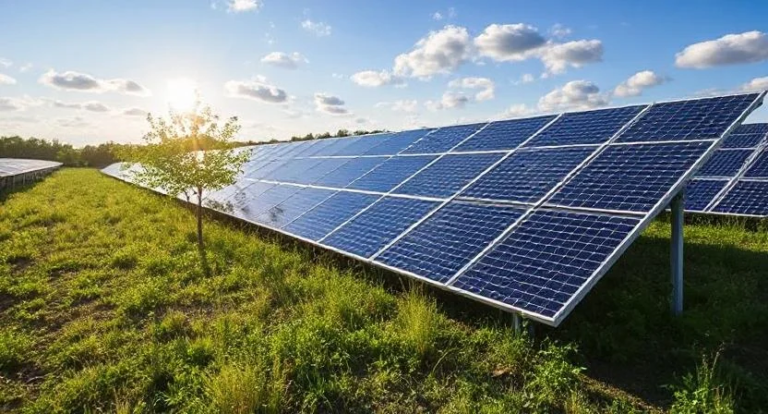Large businesses often ask if solar energy is really cost-effective. They consider the many benefits it offers. Investing in solar power involves careful consideration. It affects financial savings and supports environmental stewardship.
When looking into solar energy for your business, consider these key points:
- Initial investments
- Incentives
- Long-term gains
Stay tuned to learn how solar energy can transform your business and boost profits.
☀️ Discover Solar Solutions – Visit livingwithsolar.com →
Key Takeaways
- Initial investment considerations vary based on system size and roof condition.
- Tax incentives, like the ITC, accelerate cost savings for large businesses.
- Long-term savings from reduced energy bills and incentives enhance cost-effectiveness.
- Positive ROI achieved through savings, revenue generation, and financial benefits.
- Environmental impact assessment shows significant carbon reduction and resource conservation.
Overview of Solar Energy Benefits
Embrace the undeniable advantages of solar energy for your large business. Using solar energy can cut your electricity bills. This leads to savings over time.
Solar energy is clean and renewable. It helps your business reduce its carbon footprint and supports a sustainable future.
Investing in solar energy boosts your company’s reputation. It shows you care about the environment. This can attract eco-friendly customers and stakeholders.
Generating your own electricity on-site boosts your energy independence. It also shields your business from changes in utility prices.
Many governments give incentives and rebates to businesses that use solar energy. This makes solar a smart financial choice.
Technology has made solar panels more efficient and cheaper. This change is great for big businesses. They can cut costs and show they care about the environment.
Initial Investment Considerations
Consider the upfront cost to transition your big business to solar energy. This upfront cost is a crucial aspect to evaluate before making the switch.
Here are some key factors to keep in mind:
- System Size: Your solar energy system size affects your initial investment a lot.
- Roof Condition: Ensure your roof is in good condition to support solar panels. Any necessary repairs or upgrades can add to the initial costs.
- Energy Consumption: Check your business’s energy use. This helps find the right system size and how much to invest.
- Installation Costs: Consider costs for solar panels, mounting, wiring, and labor.
- Financing Options: Look into loans, leases, or power purchase agreements. These can help with the initial investment.
Tax Incentives and Rebates
Discover the tax incentives and rebates for big businesses switching to solar energy.
Businesses can gain from the Investment Tax Credit (ITC) by switching to solar power. This credit lets them deduct up to 26% of the total cost for installing a solar energy system.
This important tax credit can reduce the initial cost of installing solar solutions.
Businesses can also qualify for faster depreciation. This lets them recover costs for their solar energy system fast. They can use tax deductions over a shorter time.
Some states and local governments offer rebates or grants. These help businesses switch to solar energy.
These financial incentives cut the upfront cost of solar panel installation. This makes it a more attractive choice for large businesses.
Businesses can lower their environmental impact by using tax incentives and rebates. They can also save a lot of money.
Consult a tax pro or solar energy expert. They can help you grasp and make the most of the benefits for your business.
Long-Term Cost Savings Analysis

Begin by looking at how much money you can save. This will show you the long-term benefits of solar energy for your business.
To find out how much solar energy could save your large business, consider these key aspects:
- Energy Savings: Find out how much you can save on your electricity bills by using solar power.
- Maintenance Costs: Solar panels need less upkeep than traditional energy sources.
- Incentives and Rebates: Look for tax breaks, rebates, or grants to lower your initial costs.
- Energy Independence: Look at the benefits of using less grid electricity. This can save money and protect against changing energy prices.
- Environmental Benefits: Measure the long-term savings from cutting your carbon footprint. This helps support sustainability efforts.
Financial Return on Investment (ROI)
To assess the ROI of solar energy for your large business, focus on the long-term financial gains.
Investing in solar energy can save you money in the long run. It has the potential for a positive return on investment (ROI).
The first investment in solar panels can seem high. However, over time, you can save money on electricity bills. Plus, selling extra energy back to the grid can boost your financial return.
Businesses that switch to solar energy can receive incentives, tax credits, and rebates. These help improve the overall ROI.
When calculating ROI for your large business, think about the immediate costs. Also, consider the projected savings and earnings over the solar energy system’s lifespan.
Environmental Impact Assessment
When considering solar energy for your large business, think about the financial benefits. Also, remember the environmental impact of this change.
Key points about solar energy systems and their environmental impact:
- Lower Carbon Footprint: Switching to solar energy can cut your business’s carbon emissions. This helps create a cleaner environment.
- Conserving Natural Resources: Solar power reduces your fossil fuel use. This supports sustainability.
- Solar energy generation creates very few air pollutants. This is much better than traditional energy sources. As a result, air quality improves.
- Biodiversity Preservation: Solar energy helps protect ecosystems and wildlife habitats from climate change.
- Water Conservation: Solar energy systems use little or no water. This helps save this important resource compared to traditional power plants.
Understanding solar energy’s benefits can make your business greener and more sustainable.
Maintenance and Operational Costs
Running a solar energy system for a big business has important costs to keep in mind.
Regular maintenance is key. It helps the system run well and produce the expected energy.
Maintenance costs usually cover cleaning solar panels, checking for damage, and replacing parts when necessary.
Also, include costs like monitoring equipment, insurance, and admin expenses. Budgeting for ongoing costs is key. It helps ensure your solar energy system stays successful and sustainable over time.
Maintenance costs depend on the system’s size and complexity. Investing in a proactive maintenance plan can prevent costly repairs later. Some businesses choose service agreements with solar providers. This helps them manage maintenance tasks regularly.
Solar Energy Integration Strategies

To get the most from solar energy for your big business, use smart integration strategies.
Here are some ways to easily add solar energy to your business:
- Evaluate your energy needs to find the best solar solutions.
- Research local solar providers for quotes and services.
- Consider leasing or purchasing options for solar panels.
- Look into incentives or tax credits for solar installation.
- Plan for maintenance to keep your solar system running well.
- Educate your team about solar benefits and usage.
These steps can help you make a smooth transition to solar energy.
- Energy Management System: Use an energy management system to track and manage your energy use.
- Battery Storage Solutions: Use battery storage to save extra energy from your solar panels for later.
- Connect your solar energy system to the smart grid. This helps optimize how energy is distributed and used.
- Peak Shaving: Use solar energy to shave off peak demand charges and reduce overall energy costs.
- Employee Training: Teach your employees about solar energy benefits. Show them how to use it efficiently in the business.
Case Studies and Success Stories
Many big companies now use solar energy. This shows the great benefits and cost savings they can gain.
Walmart, for example, has put solar panels on many stores and warehouses. This move cuts down on energy costs and lowers its carbon footprint.
Similarly, Google has committed to using 100% renewable energy and has invested in solar projects to power its operations.
Apple is another success story. It uses solar energy to power its data centers and offices. This choice saves money on electricity and supports sustainability efforts.
These case studies show how big companies can use solar energy. They save money, help the environment, and improve their reputation as sustainable businesses.
Conclusion
In conclusion, investing in solar energy for your large business can save money, boost sustainability, and improve your reputation. With tax incentives, rebates, and improving technology, the initial investment can be offset by long-term benefits. By considering the financial return on investment, environmental impact, and integration strategies, you can make a smart decision that aligns with your business goals and values.
Frequently Asked Questions
Are There Any Limitations on the Size of Solar Energy Systems for Businesses?
Yes, there are limitations on solar energy system sizes for businesses. Factors like available space, budget, and energy needs influence system size. Consulting with solar experts can help determine the optimal system size for your business.
Can Solar Energy Systems Be Expanded in the Future for Growing Businesses?
You can expand your solar energy system in the future as your business grows. Adding more solar panels or increasing battery storage capacity is a feasible option to meet the increasing energy demands efficiently.
How Does Weather Variability Affect the Efficiency of Solar Energy Systems?
When considering the impact of weather variability on solar energy systems, remember that cloudy days or heavy rain can reduce efficiency. Stay informed about local weather patterns to optimize energy production and maximize benefits.
Are There Specific Insurance Requirements for Solar Energy Systems on Commercial Properties?
You’ll need to meet specific insurance requirements for solar energy systems on commercial properties. Make sure to understand and comply with these regulations to protect your investment and ensure coverage in case of any incidents.
What Are the Options for Disposing of Solar Panels Once They Reach the End of Their Lifespan?
When solar panels reach their end of life, recycling is a common option. Work with certified recyclers who can handle the disposal process responsibly. Proper recycling promotes sustainability and reduces environmental impact.
